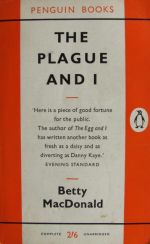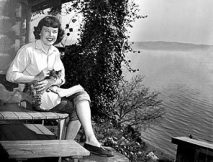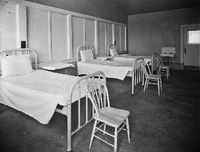
Betty MacDonald fan club fans,
Betty MacDonald fan club newsletter May will be available in the next days.
You'll enjoy it very much.
We are going to share new outstanding Betty MacDonald fan club research results for example two letters written by Betty MacDonald and her wonderful sister Mary Bard Jensen.
Betty and Mary are talking about their unique relationship.
Really fascinating!!!
We are looking for signed or dedicated first editions in great condition with dust jackets by Betty MacDonald and Mary Bard Jensen for our fans.
Betty MacDonald Memorial Award Winner Wolfgang Hampel and Betty MacDonald fan club research team are working on an updated Betty MacDonald biography and new Betty MacDonald documentary.
You'll receive a Betty MacDonald fan club message very soon.
This message includes a very nice Betty MacDonald fan club surprise and many info on our current Betty MacDonald fan club projects.
Join one of our Betty MacDonald fan club research teams, please.
Thanks a million in advance for your outstanding support.
Let's talk about Betty MacDonald fan club book cover contest.
You can vote for your favourite Betty MacDonald book cover.
Deadline: June 30, 2016
Betty MacDonald fan club book cover contest winner will be owner of a signed first edition of one of Betty MacDonald's books.
Betty MacDonald fan club honor member Mr. Tigerli and our 'Italian Betty MacDonald' - Betty MacDonald fan club honor member author and artist Letizia Mancino belong to the most popular Betty MacDonald fan club teams in our history.
Their many devoted fans are waiting for a new Mr. Tigerli adventure.
Letizia Mancino's magical Betty MacDonald Gallery is a special gift for our Betty MacDonald fan club fans.
Enjoy a new breakfast at the bookstore with Brad and Nick, please.
Betty MacDonald fan club honor member Mr. Tigerli shares his autobiography.
He is a real Casanova but this magical guy got fans from all over the world.
I belong to Mr. Tigerli's devoted fans.
Thank you so much for sharing this witty memories with us.
Wolfgang Hampel's last Vita Magica guest reader was a very famous satirical writer - Michail Krausnick.
We hope Angela Merkel's very close friend Mr. Erdogan won't have any problems with his work.
Yours,
Martine & Mats
Don't miss this very special book, please.
Vita Magica
Betty MacDonald fan club
Betty MacDonald forum
Wolfgang Hampel - Wikipedia ( English )
Wolfgang Hampel - Wikipedia ( English ) - The Egg and I
Wolfgang Hampel - Wikipedia ( German )
Vashon Island - Wikipedia ( German )
Wolfgang Hampel - Monica Sone - Wikipedia ( English )
Wolfgang Hampel - Ma and Pa Kettle - Wikipedia ( English )
Wolfgang Hampel - Ma and Pa Kettle - Wikipedia ( French )
Wolfgang Hampel - Mrs. Piggle-Wiggle - Wikipedia ( English)
Wolfgang Hampel in Florida State University
Betty MacDonald fan club founder Wolfgang Hampel
Betty MacDonald fan club interviews on CD/DVD
Betty MacDonald fan club items
Betty MacDonald fan club items - comments
Betty MacDonald fan club - The Stove and I
Betty MacDonald fan club groups
Betty MacDonald fan club organizer Linde Lund
Linde Lund shared Rita Knobel-Ulrich's photo.

‘Anybody can have tuberculosis…’
2 Replies
THE PLAGUE AND I, by Betty MacDonald, originally published in in the UK in 1948, my edition 1959 (boy, do I love old Penguins)…

One of my favourites, for years and years. I can’t remember when I first encountered The Plague and I, but certain expressions and catchphrases from it have passed into our family shorthand, so my guess is that my parents loved it too.’Toecover’, for instance, a word that describes a hand-made object of uncertain usage and all-too-certain unpleasantness. Ideally, a toecover should have no discernible function, and – in my opinion – involve limp crochet in some respect. Then there’s ‘Hush ma mouth, what have ah said?’, delivered in a clichéd Southern accent. This should be deployed after the ostensibly inadvertent revelation of some fact that has got the speaker into trouble, and is ironically directed at the person who has given the game away. Then – no, enough already. You get the idea. This should not be a funny book. Absolutely not, no way, it’s about a stay in a 1930s tuberculosis sanatorium, for heaven’s sake – and yet it is. Hilarious, even laugh-out-loud funny in parts, and yet those parts are interspersed with more serious stuff. I recently lent it to a friend who had to spend some time in hospital, and she not only loved it, finding it funny too, but also found it relevant. As she said, ‘times change, but people don’t.’

In the late 1930s Betty MacDonald – who had led a slightly unconventional life but who had, as yet, not committed any of it to paper (her best-known book is probably The Egg and I, about her first marriage to a chicken farmer and which came out in 1945) – developed a series of colds, then a cough, then extreme tiredness… But, ‘operating under the impression that I was healthy and that everyone who worked felt the same as I did’, failed to put two and two together. In all fairness, so did a series of doctors (largely because she consulted each specialist about his – and I mean his – own area), until she was finally diagnosed with TB. Tuberculosis, of course, could be tantamount to a death sentence. As it can now, sometimes – but then there were no drugs which worked against it and it was horribly prevalent. It’s also highly contaigious and MacDonald caught hers from a co-worker who managed to infect several other people as well. As a single mother with two small children and a negligible income, she was luckily admitted to a charitable sanatorium in Seattle, which she calls ‘The Pines’ in the book. She was to stay at Firland Sanatorium for nine months, in 1937-8, and emerged cured.

The picture she creates is so vivid that this is one of those books where the mental images generated are so strong that they dominate even when you see contradictory pictures of the place that inspired them. The echoing, draughty corridors, the never-ending cold, the sound of invisible footsteps approaching, passing and then fading into the distance… but it’s not depressing, even in the serious phases. It’s populated by a cast of characters, all of whom I find exceptionally well drawn and entertaining. They range from Betty’s family and her near-constant companion in The Pines, Kimi Sanbo, to the miscellaneous array of nurses and other patients such as Gravy Face and Granite Eyes (two nurses); Charlie who loved to pass on depressing news of deaths and disasters; Minna of the Southern drawl and ability to dump people in the cacky… there are so many of them, so well delineated, that picking just a few to mention here was difficult. But space has to be made for Miss Gillespie of the Ambulant Hospital’s occupational therapy shop, generator of many a toecover:
So yes, a sort of happy ending. ‘Sort of’ because Betty MacDonald died in 1958, from cancer, at the age of only 49. I’m sure she would have been surprised and possibly flattered to know that people were still enjoying her books over fifty years later. I most certainly am. Great book.

One of my favourites, for years and years. I can’t remember when I first encountered The Plague and I, but certain expressions and catchphrases from it have passed into our family shorthand, so my guess is that my parents loved it too.’Toecover’, for instance, a word that describes a hand-made object of uncertain usage and all-too-certain unpleasantness. Ideally, a toecover should have no discernible function, and – in my opinion – involve limp crochet in some respect. Then there’s ‘Hush ma mouth, what have ah said?’, delivered in a clichéd Southern accent. This should be deployed after the ostensibly inadvertent revelation of some fact that has got the speaker into trouble, and is ironically directed at the person who has given the game away. Then – no, enough already. You get the idea. This should not be a funny book. Absolutely not, no way, it’s about a stay in a 1930s tuberculosis sanatorium, for heaven’s sake – and yet it is. Hilarious, even laugh-out-loud funny in parts, and yet those parts are interspersed with more serious stuff. I recently lent it to a friend who had to spend some time in hospital, and she not only loved it, finding it funny too, but also found it relevant. As she said, ‘times change, but people don’t.’

In the late 1930s Betty MacDonald – who had led a slightly unconventional life but who had, as yet, not committed any of it to paper (her best-known book is probably The Egg and I, about her first marriage to a chicken farmer and which came out in 1945) – developed a series of colds, then a cough, then extreme tiredness… But, ‘operating under the impression that I was healthy and that everyone who worked felt the same as I did’, failed to put two and two together. In all fairness, so did a series of doctors (largely because she consulted each specialist about his – and I mean his – own area), until she was finally diagnosed with TB. Tuberculosis, of course, could be tantamount to a death sentence. As it can now, sometimes – but then there were no drugs which worked against it and it was horribly prevalent. It’s also highly contaigious and MacDonald caught hers from a co-worker who managed to infect several other people as well. As a single mother with two small children and a negligible income, she was luckily admitted to a charitable sanatorium in Seattle, which she calls ‘The Pines’ in the book. She was to stay at Firland Sanatorium for nine months, in 1937-8, and emerged cured.

The picture she creates is so vivid that this is one of those books where the mental images generated are so strong that they dominate even when you see contradictory pictures of the place that inspired them. The echoing, draughty corridors, the never-ending cold, the sound of invisible footsteps approaching, passing and then fading into the distance… but it’s not depressing, even in the serious phases. It’s populated by a cast of characters, all of whom I find exceptionally well drawn and entertaining. They range from Betty’s family and her near-constant companion in The Pines, Kimi Sanbo, to the miscellaneous array of nurses and other patients such as Gravy Face and Granite Eyes (two nurses); Charlie who loved to pass on depressing news of deaths and disasters; Minna of the Southern drawl and ability to dump people in the cacky… there are so many of them, so well delineated, that picking just a few to mention here was difficult. But space has to be made for Miss Gillespie of the Ambulant Hospital’s occupational therapy shop, generator of many a toecover:
‘Miss Gillespie was physically and
mentally exactly what you’d expect the producer of hand-painted paper
plates to be. She had a mouth so crowded with false teeth it looked as
if she had put in two sets … and her own set of rules. One of these
rules was that women patients could not use the basement lavatory
because “the men will see you go in there and know what you go
in there for”. Another forbade the pressing of men’s trousers by women,
on the grounds that such intimate contact with male garments was
unseemly.’
MacDonald is extremely good at expressing the life of any closed
institution. The way the world narrows down; the way rumours (‘all based
on a little bit of truth’) start, expand and spread; the effect of
being thrown into involuntary contact with people you would normally
avoid, and the intensity of the resulting reactions. (‘…the major
irritation of all was my room-mate, who was so damned happy all the
time, so well adjusted. She loved the institution and the institution
loved her. She loved all the nurses and the nurses loved her. She loved
all the other patients and all the other patients, but one, loved her.
That one used to lie awake in the long dark cold winter nights and
listen hopefully for her breathing to stop.’) It was a tough
regime, but it had to be – no drugs, remember. TB was essentially
treated by rest and some basic chest operations; there had to be rules.
But there was also the pointless expression of power indulged in by
some: ‘ “We do not tell the patients the rules, Mrs Bard. We find
that trial and error method is the best way to learn them.” I said, “But
how can I be obedient, co-operative, and helpful if I don’t know what
I’m supposed to do?” She said, “We don’t allow arguing, Mrs Bard”…‘
She is also very good on how difficult it is to adapt to life
afterwards, describing what could almost be a type of Stockholm
Syndrome. But she did shake herself free, and the TB didn’t reappear.
So yes, a sort of happy ending. ‘Sort of’ because Betty MacDonald died in 1958, from cancer, at the age of only 49. I’m sure she would have been surprised and possibly flattered to know that people were still enjoying her books over fifty years later. I most certainly am. Great book.
2 thoughts on “‘Anybody can have tuberculosis…’”
-
Caroline Counihan
Betty Macdonald’s hilarious chronicles of frightful experiences were huge favourites in our house too….what a shame they are out of print. Making fun of personal horrors is out of fashion now, one is expected to bare one’s soul in full but poker-faced, and there is almost a feeling that to make others laugh at any aspect of one’s tragic story is to belittle oneself or the t s. To my mind nothing is more admirable than to seek out and present the funny side of one’s experiences, it can only help others in the same fix to cope, surely? As well as oneself ↓

